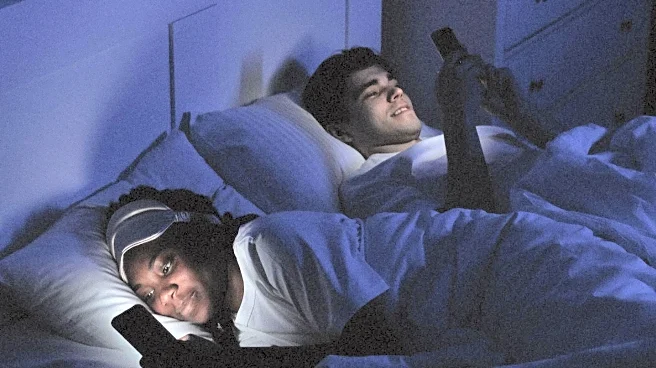What's Happening?
A recent report highlights the growing popularity of sleep trackers among U.S. adults, with nearly one in three individuals experiencing poor sleep quality. These devices measure various metrics such as heart-rate
variability, body temperature, respiration, and motion to provide insights into sleep patterns and recovery. The report emphasizes the importance of understanding sleep quality, not just quantity, as many individuals struggle with achieving restful sleep despite clocking sufficient hours. Sleep trackers come in various forms, including rings, mats, earbuds, and headbands, each offering different levels of comfort and data accuracy. The report also notes the role of pre-bedtime rituals in improving sleep quality, as well as the potential benefits of using sleep trackers to optimize sleep cycles.
Why It's Important?
The widespread use of sleep trackers reflects a growing awareness of the importance of sleep health in overall well-being. By providing detailed insights into sleep patterns, these devices can help individuals identify factors affecting their sleep quality and make informed decisions to improve it. This trend has implications for the healthcare industry, as better sleep can lead to improved physical and mental health outcomes. The data collected by sleep trackers can also contribute to research on sleep disorders and inform public health strategies aimed at addressing sleep-related issues. As more people turn to technology for health monitoring, the demand for accurate and user-friendly sleep tracking devices is likely to increase.
What's Next?
The sleep tracker market is expected to expand as technology advances and consumer interest grows. Companies may focus on enhancing the accuracy and comfort of these devices, as well as integrating them with other health monitoring systems. The development of more sophisticated algorithms for analyzing sleep data could lead to personalized recommendations for improving sleep quality. Additionally, collaborations between tech companies and healthcare providers may emerge, offering comprehensive solutions for sleep health management. As the market evolves, consumers will have access to a wider range of options tailored to their specific needs and preferences.
Beyond the Headlines
The use of sleep trackers raises questions about data privacy and the ethical implications of collecting personal health information. As these devices become more prevalent, there will be a need for clear guidelines on data usage and protection to ensure consumer trust. The integration of sleep tracking technology into daily life also reflects broader cultural shifts towards self-monitoring and health optimization, highlighting the role of technology in shaping modern health practices.








